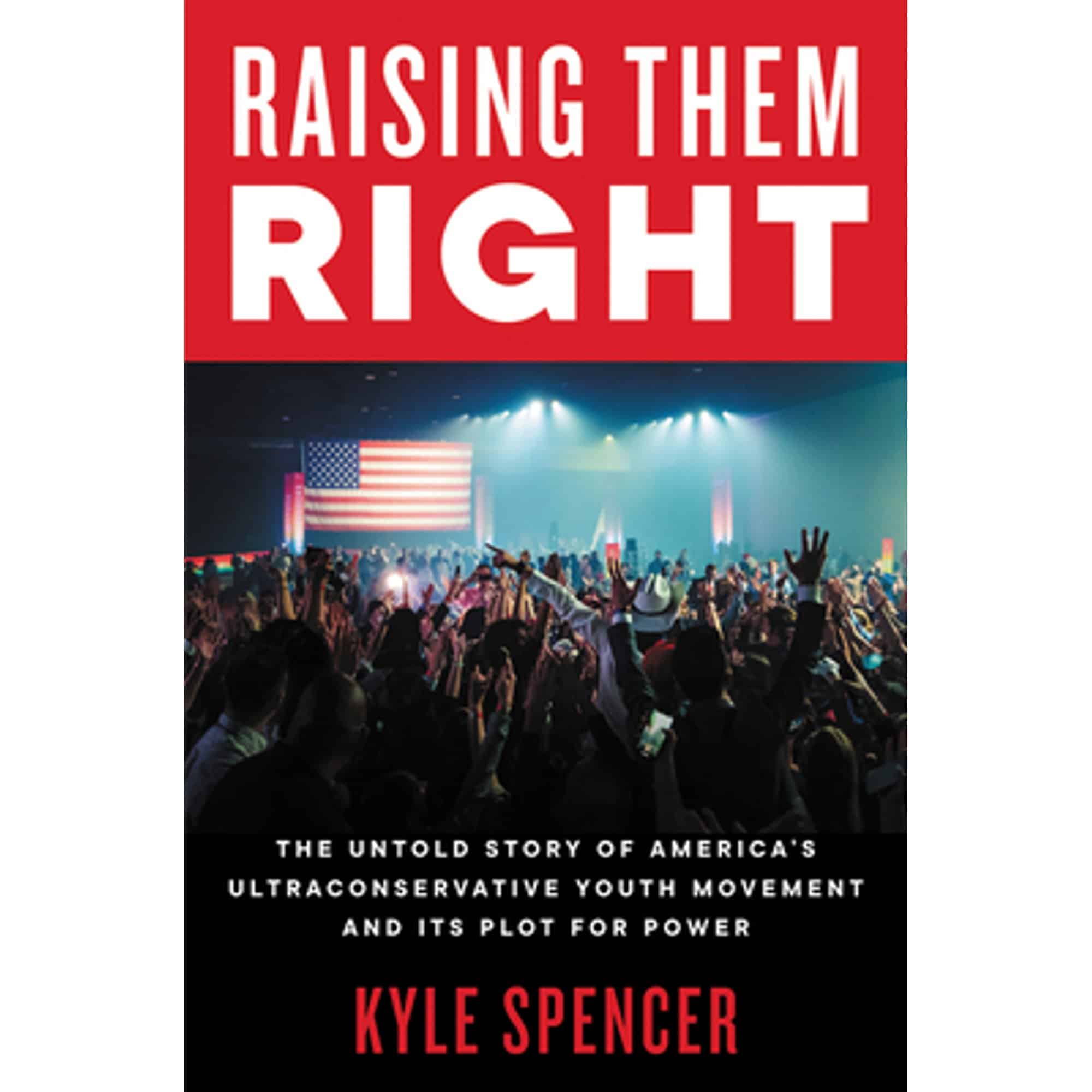Kyle Spencer’s Raising Them Right: The Untold Story of America’s Ultraconservative Youth Movement and Its Plot for Power is a cogent and thought-provoking account of the conservative struggle for the hearts and minds of America’s young voters. One important concept serves as the core of the book:
For all the right’s complaints that the American left was filled with “collectivists,” it was modern-day conservatives who were actually embracing a pass-it-down groupthink that was facilitating knowledge-sharing, mentoring, and the kind of consistent online messaging that helps win elections. (207)
Communication consultant Shenker Osorio notes: “There’s a lot of not-invented-here syndrome, where people won’t consider a good idea if they didn’t come up with it.” (207)
Over time, the topics of this shared ideology have evolved from deregulation and tax cuts to the current culture wars over Critical Race Theory (CRT) and gender identity. Today’s ultra-conservative pundit sees youth as victims of indoctrination and overt manipulation by politicians, teachers, entertainers, and a host of dangerous, morally degenerate actors intent on destroying America from the inside out.
Dozens of well-funded private think tanks and non-profit organizations have helped construct the intellectual foundation of this system for decades. The Cato Institute (1977) and the Conservative Political Action Committee (1974) are fixtures in conservative circles. Yet, few people have heard of the Foundation for Economic Education or the Intercollegiate Studies Institute, but these two groups were funded in the impressive amount of $24.5 million in 2017 alone. (92) Conservative organizations excel at raising money. Spencer points out that the top five conservative non-profits outspent their liberal counterparts by more than two-to-one in 2014. (91)
This is not a system built to improve our political discourse or create public policy solutions for the many dire problems affecting the country. It is not designed for subtle understandings or compromise for the sake of the greater good.
It is built to win.
And by “win,” conservative messaging is intent on enraging its base by “owning the libs,” raking in millions of dollars in contributions, and winning elections when it can.
Much of the rest of Raising Them Right examines three messengers — Charlie Kirk, Candace Owens, and Cliff Maloney — who have been instrumental in shaping and expressing contemporary conservative beliefs.
In many respects, Candace Owens is something of a Republican unicorn. Snarky, photogenic, and strident in public forums, the African American influencer seems tailor made for modern social media platforms that might connect young voters to conservative beliefs. And, for about the past five years, she has done just that, combining national tours with media appearances and the launch of a clothing line, all supplemented by an ongoing commentary about COVID, election fraud, and her own misinformed take on African-American history. As of this writing, Owens has 3.9 million Twitter followers.
Of the three, Cliff Maloney has attempted to convert his own brand of conservative and libertarian ideology into a concrete political action. As he rose through the ranks of Young Americans for Liberty (YAL), Maloney’s initial approach was to convert liberals, not mock them. (69) In the meantime, he spent years developing networks dedicated to electing libertarians. Before Maloney was forced to out of YAL after a 2021 sexual harrassment and assault scandal that included not only him but other YAL staffers, he had helped 179 candidates into state offices. (263)
The real star of the book is Charlie Kirk. Although he started his political life as “an eccentric loudmouth with poor social skills,” (9) Spencer chronicles Kirk’s rise to the stratosphere of the conservative movement. His particular talent is networking informed by pure personal opportunism. Although Kirk initially described Trump as a “pure demagogue” and disagreed with many of his stances (China, immigration, etc.), that changed once Trump started winning primaries. Kirk appeared at the 2016 Republican convention and started cultivating ties with Donald Trump Jr. and other incoming Republican influencers. All of this allowed him to transform his own advocacy group, Turning Point USA (TPUSA), into a conservative powerhouse.
Owens, Maloney, and Kirk have borrowed from the wisdom of many older political organizers, a group ranging from Saul Alinsky to Morton Blackwell. (103) They have been successful at portraying the American Left –a broad label that includes Democrats, Liberals, Progressives—as an existential threat to the country. Their basic training methods and administrative framework borrow from methods refined over the course of at least a half century.
The three influencers have transformed this foundation to incorporate venues better suited to the Tik Tok age. Older actions like campus Affirmative Action Bake Sales (83) and “Coming Out Conservative” celebrations (84) have waned in part because they don’t reach nearly as many students as social media platforms. Instead, TPUSA’s Professor Watchlist was launched in 2016: “to expose and document college professors who discriminate against conservative students and advance leftist propaganda in the classroom.” The American Association of University Professors saw it this way: “There is a continuing cycle of these sorts of things. They serve the same purpose: to intimidate individuals from speaking plainly in their classrooms or in their publications.”

Conservative campaigns like the Professor Watchlist or Candace Owens’ BLEXIT (Black Exit) tour — which encourages African Americans to abandon the Democrat Party and its policies — have been very effective in causing media ripples, gathering attention, and generating contributions. But there are distinct limits to the art of online controversy. It does not create solutions or build pathways to them. Twitter, Instagram, and Tik Tok lack the time or interest in depth or complexity, something good policy requires. At points, oversimplifying information is a deliberate choice. According to Spencer, conservative organizations are encouraged to reduce subtle policy issues to short talking points illustrated with grade school-level language. (64)
The impact of these campaigns on young Americans has been limited so far. The Pew Research Center and other polling organizations indicate that substantial majorities of Gen Z and Millennials believe in diversity and greater government involvement in life. A February 2023 Brookings Institute study noted that new voters overwhelmingly chose Democrat candidates in the midterms last year. This was especially true in key battleground states like Pennsylvania, Arizona, and Georgia. Viewed through the lens of gender and race, these trends are even more pronounced. In 2022, 72 percent of women 18-29 voted Democrat, according to CNN exit polling. The same poll noted that 89 percent of African Americans in the same age group also voted blue.
Although this may be encouraging to part of the country, it is not the whole story. The long-term may witness very different outcomes. Unlike TPUSA, many more traditional conservative organizations — the Federalist Society comes to mind — adopt a quieter, more patient and incremental approach to their goals. America’s political future is being fought over not just at the ballot box, but in the K-12 school systems that will educate our next generation of politically active citizens. Big money donors in local school board elections and “grassroots” groups like Moms for Liberty may prove to be far more important than Charlie Kirk could ever pretend to be.
Right now, we must also confront the immediate consequences of a conservative infrastructure purpose-built for outrage and grievance. Following the logic of Owens, Maloney, and Kirk, existential threats to the very soul of America requires equally drastic responses. Interpretations vary. As one young listener told Kirk after a 2021 speech for his Exposing Critical Racism tour at Boise State University: “This is tyranny. When do we get to use the guns?” (274)
None of this is just talk anymore. January 6th aside, mass shootings in Buffalo, New York, or El Paso, Texas or a dozen other places speak to a small, violent contingent willing to act on their own warped convictions. This segment of the ultra-conservative movement sees bloodshed as their way of “owning the libs” in contemporary America. Whether or not they represent the fringe of society is an open question. According to a February 2021 American Enterprise Institute poll, 56 percent of Republicans supported the idea of using force “to arrest the decline of the traditional American way of life.”
And perhaps that is the most important takeaway from Spencer’s book. For all their constant talk of representing a bastion of Christian values, there is a disturbing and consistent refusal by Kirk, Owens, and their cohort of young conservatives to recognize the moral consequences of their actions. They should, especially now that the country is about to embark on another cycle of presidential election politics.
Responsible citizens, old and brand new, take note.







